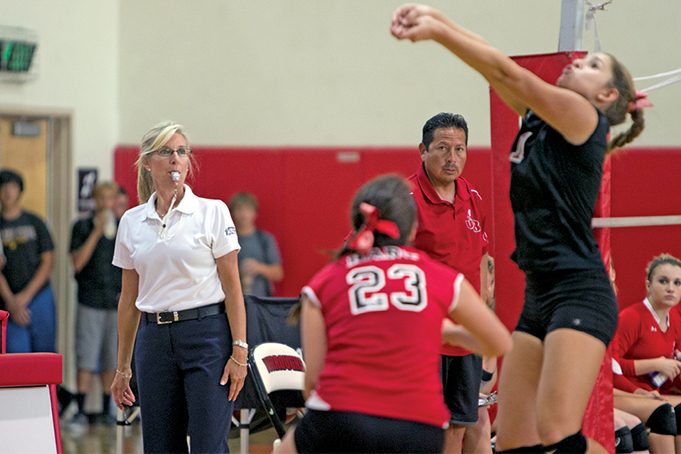If someone told you a they had a way to get better by next week, would you do it no matter what it was? How about if it took a week, a month or a year to see results? It’s safe to assume that most of us want to improve and be great officials. But is getting there worth your time and effort?
How much time you are willing to devote to improvement is totally up to you. We’re ready to share some quick fixes — things that will start to help you as soon as next week. We’ll follow these up next week with other ways to get better that will take some dedication and effort over the long haul. You can also read back to our list of ways to Get Great Series: Better by Tomorrow.
Apply the following ideas and you’ll get better. Whether you are new to officiating or getting close to hanging it up, you can upgrade your game by putting the short-term or long-term plans into action.
Get Better By Next Week
Tell assigners you’re available
If you know ahead that there is a potential for games to be postponed due to weather within the next week, notify the assigners that give you games of your availability dates beyond the day(s) the forecasted storm strikes. Even if there isn’t a storm brewing and you would like to fill an open date or two, email or text the assigner(s) with your availability. Assigners want to know your open dates, especially if you are a quality official. If other officials sustain injuries or become ill, you will likely be at the top of that assigner’s list to step in, and he or she will appreciate it.
Work a scrimmage
If the season is near and there is a call-out for officials to work a scrimmage, do it, even if you’ve worked a couple of scrimmages already. It’s a great way to get into the mind-set of that sport and sharpen your skills. That will make you better, and that’s the most important ingredient to prepare yourself for the big games on your upcoming schedule. Take a scrimmage opportunity as a chance to exhibit the three Rs: renew, refresh and rejuvenate. It’s a time to give whatever it may be — whistle, flag, card — and your mind some exercise.
Attend and participate in an association meeting
Be prepared to not only attend but to participate fully at meetings. Physical presence alone won’t help you improve skills or increase your schedule. Write down questions in advance to ask at the upcoming meeting. Did something unusual happen during a game? A play or ruling? Bring it up at the right time at a meeting. Is there a philosophical issue you’ve been wondering about? There are plenty of seasoned officials who will gladly share their advice.
Read one chapter of the rulebook
The most successful officials are usually those who truly believe there’s always something to learn and sometimes that comes by reviewing rules. Read one chapter of the rulebook within the next week, and chances are you will learn something that you did not know prior to the review.
Review specific plays and situations in rulebook and casebook
If you had to think about a rule or were unsure of it during a recent game, review that rule in the rulebook soon after the game. Once you’ve grasped the rule, read the related casebook and manual before moving to other rules that you know you need to learn and remember. As a bonus, you can search for related quiz questions to reinforce what you know or focus on what you don’t know.
Review notes from each game/ match during past week
Take a notebook with you to your games and make note of topics of conversations during pregame, halftime and postgame discussions. Review the areas of concern from your past game(s). Do you have a specific rule or caseplay you need to review? Do you need to improve your positioning in a certain situation?
Review video from each game during the past week
Video again? Yes. Find ways to get recent video of yourself officiating. Coordinate with the school and/ or athletic director to get a copy of the game video or purchase a video camera and recruit a friend to record the game. Take full advantage of the video and don’t just view the footage for call validation. Compare your positioning in each game during the week. Determine the cause for why you got something wrong or what may have caused you to miss something happening. Note your presence and body language and figure out ways to improve.
Network with other officials
Attending local association meetings allows you to connect with other officials and experts. Try to either form a group of officials or become part of a group, so that you can make them your “go to” people regarding any questions about specific plays, rules, assignments and whatever it might be related to your sport. They, in turn, will likely come to you for help as well. Having a group of officiating buddies in your sport is both fun and good for your mental health. Your friends are your network and they can help you advance with a good word to the right person. Friends will provide advice when you are down and can be the people who help you get to the top. Don’t expect someone else to get it done for you — you still need to demonstrate your skills on the court or field. But your buddies can provide an extra nudge at the right time. Network with officials from across the country at the annual Sports Officiating Summit.
Rehearse responding statements
Keep track of the comments directed to you by coaches. When you have free time away from the game(s), practice rehearsing statements you would make to those specific comments. Role play those situations with partners during pregames. Have one partner play the role of coach and another play the official with a back-and-forth exchange. One such statement was covered in our article An Effective Way To End An Argument.
Watch other officials work a local game
Watching officials is an often forgotten way for improvement. There are at least one or two things, if not more, you can pick up from every official you watch work. Find those things that other officials do well and incorporate them into your game. Talk about the situations that occur in the games you watch and think about ways you may handle them. How would you apply a play you see at a different level to the games and levels you work?
Visualize upcoming game
Take time a few days during the week to think about an upcoming game. Visualize yourself being successful in that game. Visualize yourself working in the specific environment. Positive mental thinking can work wonders on improving your performance during the game. In order to be successful you must know that you can see yourself working in a particular environment, especially if it’s a big game, unfamiliar situation or environment you may not be familiar with.
Get Great Series:
What's Your Call? Leave a Comment:
Note: This article is archival in nature. Rules, interpretations, mechanics, philosophies and other information may or may not be correct for the current year.
This article is the copyright of ©Referee Enterprises, Inc., and may not be republished in whole or in part online, in print or in any capacity without expressed written permission from Referee. The article is made available for educational use by individuals.
















